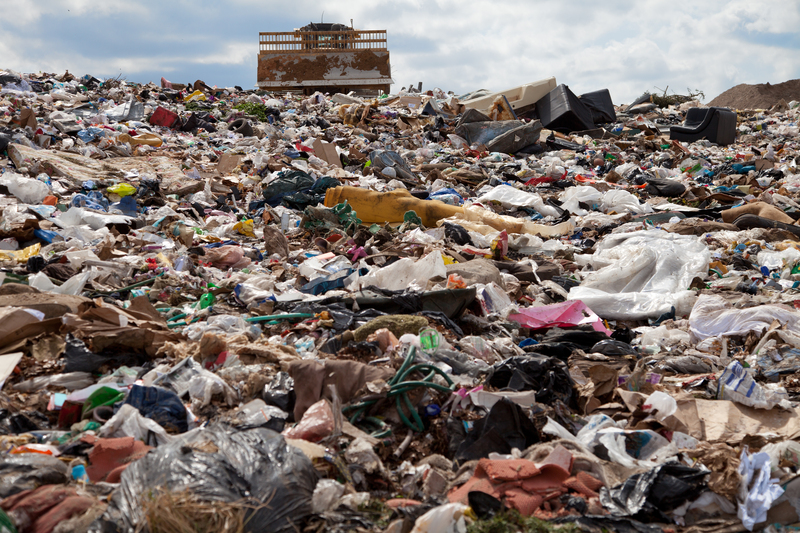Sustainable Living: Essential Waste Prevention Tips
Posted on 28/09/2025
Sustainable Living: Essential Waste Prevention Tips
Sustainable living is becoming increasingly crucial in our modern world due to climate change, resource limitations, and environmental degradation. A core aspect of this lifestyle is effective waste prevention. By reducing, reusing, and recycling, you can significantly minimize your ecological footprint while embracing a greener way of life. This comprehensive guide explores essential waste prevention tips to transform your habits and contribute positively to the planet.
Understanding Sustainable Living and Waste Prevention
Living sustainably means making conscious choices that protect the environment, promote social responsibility, and support economic viability for the long term. A major component of this practice is waste prevention, which involves strategies to avoid the creation of waste before it starts. By proactively preventing waste, you help conserve resources, reduce pollution, and support a healthier ecosystem.
Why Waste Prevention Is Vital for a Sustainable Future
Producing and managing waste has a substantial environmental impact. Here are just a few reasons why adopting waste reduction strategies is essential:
- Conserves Natural Resources: Preventing waste reduces the need for raw material extraction, protecting forests, water supplies, and wildlife habitats.
- Reduces Pollution: Less waste means fewer items in landfills and incinerators, minimizing soil, water, and air pollution.
- Saves Energy: Producing new products from raw materials requires more energy than reusing or recycling.
- Decreases Greenhouse Gas Emissions: Waste management facilities are major sources of greenhouse gases--effective prevention lessens these emissions.
- Supports a Circular Economy: A focus on preventing waste fosters creative solutions, like product redesign and upcycling, closing the loop on resource use.

Practical Waste Prevention Tips for Sustainable Living
Adopting a lifestyle focused on waste reduction and sustainability involves simple, actionable changes. The following sections outline several strategies you can implement immediately to make a significant impact.
1. Mindful Purchasing Habits
- Buy Only What You Need: Make shopping lists and stick to them. Impulse buying leads to unnecessary purchases that often end up as waste.
- Choose Quality Over Quantity: Invest in durable goods designed to last. While they might cost more upfront, they reduce the frequency of replacements.
- Select Products with Minimal Packaging: Excess packaging is a major source of waste. Opt for items with biodegradable, recyclable, or reusable packaging materials.
- Support Local and Bulk Stores: Buying local reduces transportation emissions, and bulk purchasing decreases packaging waste significantly.
2. Embrace the Reduce, Reuse, Recycle Philosophy
This well-known mantra is the foundation of sustainable waste management. Here's how to integrate each aspect:
- Reduce: Always ask yourself if you truly need an item before buying. Minimize single-use products and avoid disposable goods wherever possible.
- Reuse: Get creative! Repurpose containers, jars, and packaging for storage or DIY projects. Donate or sell items instead of discarding them.
- Recycle: Understand your local recycling guidelines. Properly sort your recyclables to ensure they're processed effectively. Remember that recycling should be the last resort after reducing and reusing.
3. Composting Organic Waste
Food and yard waste compose a large portion of household garbage. Composting transforms these organics into valuable fertilizer for your garden. Here's how to start:
- Collect Food Scraps: Keep a separate bin for fruit and vegetable peels, coffee grounds, eggshells, and tea leaves.
- Include Yard Waste: Add grass clippings, leaves, and non-diseased plant trimmings to your compost pile.
- Balance Green and Brown Materials: Greens (food scraps) add nitrogen, while browns (dry leaves, cardboard) provide carbon. Balance both for effective decomposition.
- Avoid: Meat, dairy, oil, and synthetic materials, as these can attract pests and create odors.
- Use Finished Compost: Enrich your garden soil, feed houseplants, or share with neighbors.
4. Eco-Friendly Food Practices
- Plan Meals in Advance: Reduce food waste by scheduling meals, using leftovers, and freezing excess for later.
- Shop with a List: Only buy what's needed to minimize spoilage and avoid impulse buys.
- Store Food Properly: Use airtight containers and organize your fridge to prevent perishable items from being forgotten.
- Compost Food Scraps: As noted above, composting is an eco-friendly way to handle unavoidable organic waste.
5. Zero Waste Swaps for Everyday Essentials
Expand your commitment to sustainable waste prevention with smart product swaps:
- Reusable Shopping Bags: Ditch single-use plastic for sturdy cloth or mesh bags.
- Glass or Stainless Steel Containers: Replace disposable food storage with durable, reusable options.
- Beeswax Wraps: Substitute plastic wrap with washable, biodegradable alternatives.
- Bamboo Toothbrushes: Switch to compostable versions rather than plastic brushes.
- Refillable Water Bottles and Coffee Cups: Eliminate the need for single-use plastics by carrying your own drinkware.
6. Digital Waste Management
In our increasingly digital world, managing electronic waste is crucial to sustainable living:
- Properly Recycle E-Waste: Donate or recycle old phones, computers, and batteries according to local regulations.
- Cloud Storage and Paperless Practices: Go digital with bills, files, and photos to reduce paper and physical storage needs.
- Regularly Declutter Devices: Remove unused apps and files to extend the lifespan and efficiency of your electronics.
7. Green Cleaning Products
Conventional cleaning products often come in single-use packaging and can be hazardous to the environment. Switch to eco-friendly alternatives:
- DIY Cleaners: Use household staples like vinegar, baking soda, and lemon for most cleaning tasks.
- Bulk Refill Stations: Purchase cleaning supplies from stores that offer refills to cut packaging waste.
- Cloth Towels and Sponges: Replace paper towels with washable, reusable cloths or sponges.
8. Sustainable Fashion Choices
The clothing industry is a major contributor to global waste. Adopt sustainable practices for your wardrobe:
- Buy Secondhand: Thrift stores and online marketplaces offer quality clothing without the environmental toll of producing new garments.
- Choose Quality Over Quantity: Invest in well-made, timeless pieces rather than fast fashion.
- Repair Instead of Replace: Mend holes, replace buttons, or tailor outdated garments to extend their life.
- Host Clothing Swaps: Exchange clothes with friends to refresh your style without creating waste.
How to Integrate Sustainable Waste Prevention Into Your Lifestyle
Create an Action Plan
Lasting change comes from setting clear, manageable goals. Start by auditing your current waste generation. Note the types and quantities of waste you typically produce in a week. From there:
- Identify Key Areas for Improvement: Focus where you create the most waste--whether it's food, packaging, or clothing.
- Set Achievable Goals: Implement one change at a time. For instance, eliminate single-use bags this month, then tackle composting next month.
- Measure Your Progress: Regularly assess your habits and adapt your plan as needed. Celebrate achievements and stay inspired!
Engage Your Community
Waste prevention becomes easier when supported by a community. Here's how to get others involved:
- Share Knowledge: Educate friends and family on sustainable waste solutions through conversations or social media posts.
- Join or Start Local Initiatives: Participate in or organize neighborhood clean-ups, recycling drives, or zero-waste workshops.
- Advocate for Policy Change: Encourage local governments to adopt green policies, support recycling programs, and ban single-use plastics.
Stay Informed and Inspired
The journey toward a zero-waste lifestyle is ongoing. Keep up with the latest sustainable living trends and technologies. Follow blogs, attend workshops, or read news on recent developments in waste prevention and eco-friendly living.

Frequently Asked Questions About Sustainable Waste Prevention
What is the difference between waste prevention and recycling?
Waste prevention focuses on avoiding the creation of waste in the first place by reducing consumption and reusing items. Recycling occurs after waste is generated, by turning used materials into new products. Prevention is preferable to recycling on the waste hierarchy, as less waste means fewer resources are needed to manage it.
Can small lifestyle changes really make a difference in waste reduction?
Absolutely! Every action contributes to a larger impact. If each person implements even a few sustainable living tips, the cumulative effect can significantly reduce global waste and environmental pollution.
How do I start composting if I live in an apartment?
Apartment dwellers can use countertop composting bins or participate in community garden programs with composting options. Some cities offer municipal composting pickup or drop-off points--research your local options.
Which products should I avoid to cut down on waste?
Avoid single-use plastic items (bags, straws, cups, cutlery), excessive packaging, disposable cleaning supplies, and fast fashion. Opt for reusable, repairable, and recyclable products whenever possible.
Conclusion: Embrace Sustainable Waste Prevention for a Greener Tomorrow
Sustainable living begins with intentional waste prevention. Incorporating these waste reduction tips into your everyday routine helps conserve resources, minimizes pollution, saves money, and fosters a healthier planet for future generations.
Start small and stay consistent--each eco-friendly choice brings you closer to a zero-waste lifestyle. Encourage friends, family, and your community to join you on this journey toward a cleaner, more sustainable world.
Ready to make a difference? Begin with these simple, impactful tips today and become a leader in sustainable waste prevention!
Latest Posts
Essential Knowledge: What You Need to Know About Builders Skips
Your Path to a Tidy Office: Successfully Clear Out and Organize
Avoid Pitfalls: Skip Hire Best Practices Examined
Sustainable Cardboard and Packaging Waste Disposal
Revolutionize Your Home Recycling with These Top Suggestions

 020 3875 4121
020 3875 4121 020 3875 4121
020 3875 4121




 House clearance
House clearance Rubbish collection
Rubbish collection When it comes to your house clearance London you won’t find a better firm in town than London Rubbish Removal! We have a range of ways to...
When it comes to your house clearance London you won’t find a better firm in town than London Rubbish Removal! We have a range of ways to... London Rubbish Removal is just waiting to help you...
London Rubbish Removal is just waiting to help you...





